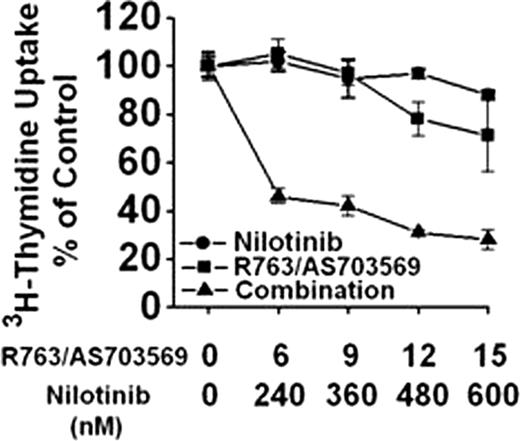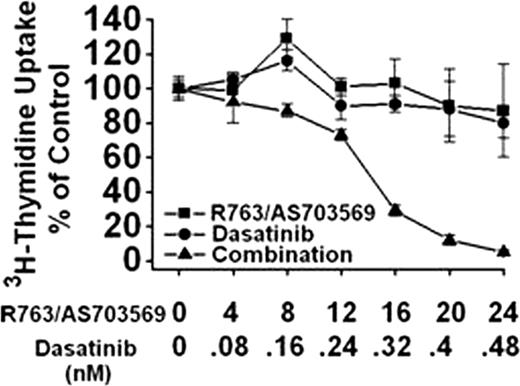Abstract
Abstract 3394
Resistance to imatinib is a major clinical problem and challenge in advanced chronic myeloid leukemia (CML). In most patients, drug-resistant mutants of BCR/ABL are detectable. Although most of these mutants still are responsive to second generation BCR/ABL kinase inhibitors (KI) such as nilotinib or dasatinib, drug responses are often short-lived. The BCR/ABL mutant T315I confers resistance against all available BCR/ABL KI, including nilotinib and dasatinib. More recent data suggest that several Aurora kinase (AuK) inhibitors block the kinase activity of BCR/ABL T315I. We have examined the growth-inhibitory effects of the AuK/ABL inhibitor R763/AS703569 (Merck-Serono, Darmstadt, Germany) on primary CML cells (chronic phase, n=12), the CML cell line K562, and Ba/F3 cells transfected with various imatinib-resistant mutants of BCR/ABL. As assessed by 3H-thymidine-uptake, R763/AS703569 was found to inhibit proliferation in imatinib-sensitive and imatinib-resistant primary CML cells in all donors tested, in imatinib-resistant and imatinib-responsive K562 cells, and in Ba/F3 cells harbouring various mutants of BCR/ABL (E255K, Y253F, H396P, T315I). The effects of R763/AS703569 on BCR/ABL-transformed cells were dose-dependent with IC50 values ranging between 0.001–0.1 μ M in K562 cells, <0.001-1 μ M in primary CML cells, and 0.001–0.1 μ M in BCR/ABL+ Ba/F3 cells. In all three patients in whom an imatinib-resistant BCR/ABL mutation was detected (one with V379I, one with F359V, and one with T315), R763/AS703569 was found to inhibit growth of primary CML cells at pharmacologic concentrations (IC50: 0.5, 0.005, and 0.05 μ M, respectively). As assessed by flow cytometry, the growth-inhibitory effects of R763/AS703569 were accompanied by DNA endoreduplication and consecutive apoptosis. Western blot experiments using anti-pCrkL antibody were performed and confirmed that R763/AS703569 blocks BCR/ABL activity at 1 μ M in K562 cells and BCR/ABL-transformed Ba/F3 cells. In addition, R763/AS703569 was found to block Aurora kinase A and Lyn phosphorylation in CML cells. By contrast, no effect of R763/AS703569 on phosphorylation or expression of Polo-like kinase-1 (Plk-1) was seen. In a next step, we explored the effects of drug combinations on growth of K562 cells and BCR/ABL-transformed Ba/F3 cells. In these experiments, R763/AS703569 was found to synergize with the ABL/multi-kinase inhibitors nilotinib (Novartis, Basel Switzerland) and dasatinib (Bristol-Myers Squibb, Princeton, NJ) in producing growth inhibition in CML cells (figure). Moreover, R763/AS703569 and the Plk-1 inhibitor BI 2536 (Boehringer Ingelheim, Vienna, Austria) were found to produce synergistic growth-inhibitory effects on CML cells in all samples tested. Synergistic effects of the KI applied were also seen in Ba/F3 cells exhibiting BCR/ABL T315I. In summary, our data show that the novel AuK/ABL inhibitor R763/AS703569 produces growth inhibition and apoptosis in BCR/ABL-transformed cells including those harbouring BCR/ABL T315I or other imatinib-resistant BCR/ABL mutants. Moreover, our data show that R763/AS703569 synergize with other multi-kinase/ABL inhibitors as well as with the Plk-1 inhibitor BI 2536 in producing growth inhibition in imatinib-resistant CML cells. Whether R763/AS703569, applied alone or in combination with other targeted drugs, can produces anti-leukemic effects in patients with advanced CML remains to be determined in clinical trials.
Synergistic growth-inhibitory effects of R763/AS703569 and nilotinib in BCR/ABL T315I+ Ba/F3 cells (left), and R763/AS703569 and dasatinib in K562 cells (right).
Valent:Novartis: Research Funding; Bristol-Myers Squibb: Research Funding; Merck-Serono: Research Funding.
Author notes
Asterisk with author names denotes non-ASH members.



